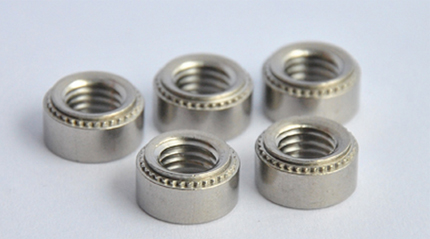When we use Self Clinching Nuts, we often encounter some questions. For those who don't know about Rivet Nuts, they don't know how to better deal with these questions. Therefore, the following author lists some common questions about rivet nuts for us, hoping to help us use rivet nuts.
1. What materials are high-strength screws made of?
Pem Rivet Nuts usually refer to screws above grade 10.9, and stainless steel screws above grade 10.9 should be 34CrNiMo or 34CrNi3Mo. Of course, heat treatment is indispensable.
2. Why is it forbidden to get in the rain before the high-strength bolts of the steel structure are finally screwed?
Afraid of rust!
3. Can PEM rivet nuts be used in the connection of aluminum materials?
Are you going to use aluminum to withstand heavy loads? How can materials that are not of the same strength level be used together? If used, the pre-tightening force of the bolts cannot exceed the acceptable strength limit of aluminum.
4. What are the requirements for the construction pre-tension of high-strength bolts?
It should meet the design requirements, and neither the undertightening value nor the overtightening value should exceed 10% of the specified value.

5. Questions about high-strength fasteners?
1) Guaranteed strength requirements: Guaranteed load and wedge load are the key items (category A) to check the mechanical performance of products under the action of tensile load, especially for high-strength fasteners. The guaranteed load is to check the ability of the product to resist plastic deformation under a specified tensile load. If the item does not meet the requirements, due to the effect of pre-tightening force and operating load, plastic deformation may occur, and then reduce the pre-tightening force to loosen the connection. . Fatigue test is to check the tensile strength and head rod connection strength of bolt products.
2) Hardness requirements: The hardness of stainless steel screws is also the primary target for checking the mechanical performance of fasteners. The materials selected for products of various functional grades are different. The mechanical performance grade is the primary basis for the selection of non-standard screw fasteners. During installation and use, the operating load and installation torque should be determined according to the performance level. For specific materials, the hardness should be controlled at a reasonable level. High hardness may reduce the fatigue resistance of the product. Some companies control the hardness in order to improve the strength of the product. At higher levels, some commodity overruns form
3) Decarburization layer overrun: The decarburization layer is also a category A project. Because of decarburization, the surface hardness and strength of the parts are greatly reduced, which seriously affects the surface contact strength and fatigue life of non-standard screw self clinching fasteners, especially the damage to the threaded parts. for outstanding. The main reasons for decarbonization are decarbonization of raw materials, decarbonization in the process of material transformation and decarbonization in the process of product heat treatment.